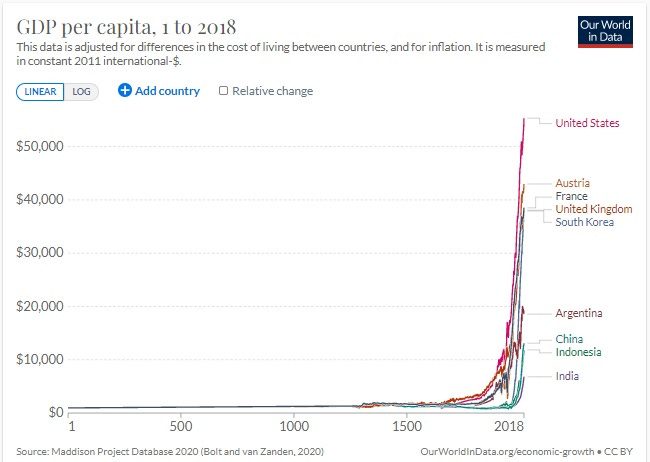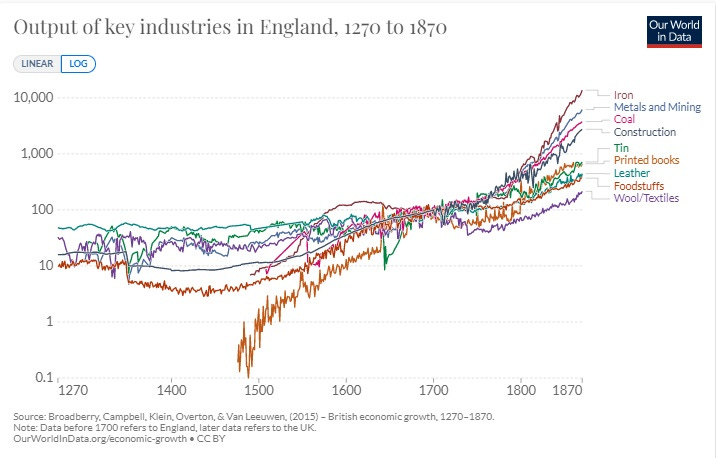What is progress and how do we get more of it? It's a core question here at Faster, Please! and something Jason Crawford thinks a lot about. Jason is the founder of The Roots of Progress, a nonprofit dedicated to establishing a new philosophy of progress for the 21st century. He writes about the history of technology and industry and the philosophy of progress.
In this episode of Faster, Please! — The Podcast, Jason explains how progress is about more than just economic growth, discusses where it comes from, and distinguishes progress from utopianism. Below is an edited transcript of our conversation.
James Pethokoukis: You are part of a growing intellectual movement that aims to understand two big things: why human progress happens and how to speed it up. First of all, why is this of interest to you?
Jason Crawford: Most of my career for almost 20 years was in the tech industry. I have a background in computer science. I was a software engineer, engineering manager, and tech startup co-founder. And about five-plus years ago, I got really interested in progress. It began as an intellectual hobby, and I just came from the perspective that, like, the progress in material living standards over the last couple of hundred years—I mean more than an order of magnitude improvement in industrialized countries—is basically the greatest thing ever to happen to humanity, or at least way up there. You know, in the top three. And if you care about human wellbeing and you look at this fact of history, I think you have to be a little awestruck about it. And I think you have to ask three basic questions: First, how did this happen? Second, why did it take so long to really get going? And three, how can we continue it into the future?
What do we mean by progress? Are you talking about spending power or are you talking about human lifespan? Leisure time? People could define it differently. When we use the word progress during this conversation, what are you talking about?
Yeah, there's at least two basic and important meanings to progress. So one is progress in our capabilities, our ability to understand and control the world: science, technology, industry, infrastructure, wealth accumulation, and so forth. But then there's …
I love that wealth accumulation part. Oh man, I love hearing about that.
Surplus wealth is very important, and infrastructure is a form of wealth, right? But then there's an even deeper—I think the ultimate meaning of progress, the true progress of human progress is progress in human wellbeing: the ability to live longer, happier, healthier lives, lives of more freedom and choice and opportunity with more things open to us, more ability for self-actualization. Ultimately, it's that human progress that matters, and it’s why we care about this.
I think a lot about choice and opportunity, the human freedom aspect. Sometimes when I talk about it, people will kind of condense it down to “stuff.” Like, “You just want more stuff. How much more stuff do we need?” But I think there is that deeper meaning, and I don't think most people who are interested in progress and these questions are interested in it just because they just think we want more stuff.
First off, stuff is underrated. People like to dismiss it as if material comforts don't matter. They matter a lot. And I think people just take the current level of affluence for granted and they don't think about how life could be way better. You know, people in 1800 if you could ask them, they would probably say they were fairly satisfied with their lives as well. They had no idea what was possible.
But you're right that it's not just about stuff. I mentioned choice and opportunity. Think about the ability that the average person has (at least the average person in a reasonably wealthy country) to live where they want, to have the kind of job that they want instead of having to be a farmer or just having to accept the trade that their father had, the ability to marry whom they want when they want, to have children or not and how many children to have and when to have them, the ability to go on vacation.
There are a lot of these things that we take for granted now that people did not always have. So it's not just about a full belly and a roof over your head and a warm bed to sleep in at night. Those are great things. And, again, they're underrated. But it's also about romance and knowledge and exploration and excitement and adventure and self-actualization, and self-expression—all of those very human values, which are psychological values. Those are also supported and enabled by material progress.
Do we still not know how progress happens, for the most part? We know institutions are important. Deirdre McCloskey talks about the Bourgeois Deal, in which innovators said, “Let me creatively destroy the old and bad ways of doing things, the scythes, ox carts, oil lamps, propeller planes, film cameras, and factory lacking high-tech robots, and I will make you all rich.” Do we need to know more than that?
Those questions that I posed earlier, I'm obviously not the first person to ask any of them or even to deeply study them. So two things: First off, I think that while the knowledge is out there and is maybe well known to academic experts who study this stuff, I don't think it's ever been given really great popular treatment. And definitely not one that goes into … remember the very first question that I posed was literally, how did it happen? So when I started, I went into this study and I'm now writing a book because there was a book that I wanted to read five years ago and I couldn't find it. It didn't exist. I don't think it does exist. I wanted to learn in one volume, in one summary, what were the major discoveries and inventions that created the modern world, and that gave us this standard of living?
And I wanted to really understand what were we doing wrong that made agricultural productivity so low? What were we doing wrong that made disease so rampant, right? What were we doing wrong such that most people were stuck going not very far outside their village their entire lives? And I mean, doing wrong: I say that a little tongue in cheek. Obviously we were doing something wrong. We just didn't know how to do it better, but what did we have to learn? So I don't think that that has ever been put together in a very accessible summary for the general public in a single volume.
You said a lot of this information is out there, but it's more academic so we need to popularize it. Though, for sure, we're not just talking about old papers that we're going to refer to. There's plenty of new research on the Industrial Revolution; on how you create today a modern, fast-growing economy; how you increase productivity growth. It's a well-researched topic on which the research is definitely ongoing.
Yeah, absolutely. So that's the other part of it, which is that even within academia, even at the frontiers of knowledge among the experts, there are open questions and there's still, frankly, a fair bit of disagreement. If you want a good summary of the academic literature and where the state of the discussion is at this point, there's a new book that just came out, How the World Became Rich, by Koyama and Rubin. It does a good job of summarizing [of] the academic literature. I do think there's a fairly good consensus, or at least among most folks in the field, that institutions and culture somehow are at the root of a lot of both how the original Great Enrichment began and also why some nations have caught up and others haven't.
I think there are still a good amount of open questions at a sort of fine-grained detail level: If it's institutions and culture, which institutions exactly? And which aspects of culture really make the difference? You can look at Britain and you can say they were able to create the Industrial Revolution, in part, because they had a great deal of economic freedom among other things. But then you can also look at various Asian countries that have caught up in a large part in terms of economic growth with some economic freedom, but certainly not the level that Britain had.
And even Britain was sort of weirdly missing things. Like, for more than a century after the South Sea bubble in 1720 it was extremely difficult to create a corporation, let alone a limited liability corporation, right? So you could make a partnership like Boulton and Watt, but to do a corporation I believe required an act of Parliament for over a hundred years. Now, making it easy to create corporations is sort of a key institution and ultimately a key part of economic freedom. Britain was able to start the Industrial Revolution without that. So if you want to really understand what's going on here, you have to get to a pretty fine-grained level. And I think that is still an open area of research.
I think that's an interesting point. You bring up corporations. It's not just technology; it's not just the steam engine or the combustion engine or Moore's law and the microchip. It's not just these bits of technology that somehow happen and thank goodness they did. And maybe in the future will get more. It's broad; it's really kind of a holistic, whole-society thing where you have culture, you have institutions, you certainly have innovators and entrepreneurship. So it's figuring out all these things. Why I find it so fascinating is that it provides a lens to examine all parts of human activity. In my newsletter on Substack, I write about movies and TV shows and books: the cultural aspect. I'll also talk to technologists and I'll talk to economists because all those pieces added together are what create progress.
You can look at economic freedom as one thing that happened in Britain that helped create the Industrial Revolution. But I also think it is not at all a coincidence that Britain was the land of Locke and Bacon and Newton. There was something much deeper than just laws and politics going on, something at the level of philosophy and culture, I think, that enabled them to break out the way they did.
Part of this is the belief that you can solve problems. Your solution may create some other problem, but we can solve that one, too. It's about a belief that we can make tomorrow better. But it's not about creating utopia, because some of those solutions are going to create new problems.
I do like the term “solutionism,” and in fact, I adopted that term in an opinion piece I wrote for MIT Technology Review a little while ago, where I was talking about optimism versus pessimism—I tend not to use the term “optimist” because there are different types of optimism, and you can have complacent optimism, where you just assume that there aren't going to be any big problems or that everything will go fine, no matter what we do.
And that is a big mistake. But you can also have more prescriptive optimism that says, “Look, we may or may not be facing large challenges. Maybe the world is even not heading in a good direction, but we have some agency. We have some ability to work and to fight if necessary and to create a better world. And so let's go about it.” Blind optimism is just complacency, but blind pessimism is just defeatism. And neither of those are good. In that editorial, I use the term “solutionism” to try to get at this mentality that both acknowledges the reality of problems, but then also acknowledges the possibility of solutions. I think that's the mindset we need.
I'm not a big believer in utopia, as long as those utopias are populated by flawed humans. But I don't think this is the best of all possible worlds. It can be better without being utopian.
I think the mistake in utopian visions is the notion that utopia is a sort of static end state and then we stop and we don't progress beyond. And I have a much more dynamic view of what even utopia is or could be and of the future. My view is one of continuous progress where we keep getting better. And then we get better after that. And then we get better after that. And, and by the way, David Deutsch points out in his book, The Beginning of Infinity, that every step of progress along the way will create new problems. And that is not an indictment of progress. It's simply the nature of progress, the same way that advancements in science open up new questions that we don't know how to answer. Advances in material progress or in technology will open up new problems that we don't yet know how to solve but can solve with the next iteration of progress.
There was a nice BBC profile of this progress movement that you were featured in. And it said that among progress thinkers, "There is an entrepreneurial bias towards action. The prospective benefits of a new technology dominate considerations of what a bad actor might do with it. The fear of missing out overwhelms the fear of losing everything." Do you think that's a blind spot? Are we too dismissive of how things might go wrong?
I think that could easily become a blind spot for the progress community. And that's part of why I don't like the term “optimist” or why I think it can be misleading. That's why I talk about complacent optimism as being not the mentality we want. We want to acknowledge and engage with many of these very real risks and concerns. If we don't, the future will go badly and that's not what we want, and there are good examples of this. Early in the development of genetic engineering, some people started to realize, "Hey, if we're not careful with this, we could be creating dangerous new diseases." And they actually put a moratorium on certain types of experiments. They called for this and got together about eight months later at a conference, the famous Asilomar Conference—1975, I think it was—to discuss safety procedures.
And they came up with a set of danger levels or risk levels for different types of experiments. And they came up with a set of safety procedures, matching those levels: “If you're at bio risk level three, you should be doing safety procedures X, Y, and Z.” So at the simplest, maybe you don't even need a mask or gloves or whatever. And then at the absolute highest level, you're in an extremely controlled room. You've got a full suit on and the room has negative pressure so that if the door accidentally opens the air blows in, not out, etc. You've got all of these things, right? And so that was a pretty effective method—proactively, by the way. Very importantly, this was not in response to an outbreak.
It wasn't like they created the disease first and killed a bunch of people and then said, “Whoops. Let's figure out how to not do that again.” They actually anticipated the potential risk, but they did so not on kind of like vague fears that were motivated by just some sort of anti-science or anti-technology sentiment. They did so by just very hard-headedly, rationally, logically looking at what could happen and, how do we prevent this? And how do we make progress and also have safety? So I think, ultimately, safety has to be a part of progress. In fact, historically, getting safer is one of the overall aspects of progress. If you set aside potential tail risk but just look at day-to-day safety, we are much safer today than we were in the past. That is an accomplishment. And really a world of progress ought to be a world in which we are getting continually safer, right? If we're not, we're missing some important aspect of it.
Of course, then there's the other side who assume any more technological progress will just make the world worse. I wrote this piece about a movie and its sequel I love. I love Blade Runner. I love the sequel, Blade Runner 2049. But it occurred to me that there's a lot of amazing technological advances in that movie. You have human-level AI, fully sentient robots. We have space colonies. You have flying cars, yet it's a terrible world. It's a world where it seems like most people don't live particularly well. The climate is horrible. But there wasn't really a mechanism in the film to say why things are bad other than, well, it works for the film, because it creates drama. Do you feel like you're making the contrarian argument in this society or you're making the argument which maybe most people believe, but maybe they forgot that they believe it?
I think it has become contrarian to think that continued scientific and technological and industrial progress will actually lead to human wellbeing. I think that was not contrarian, say, a little over 100 years ago. Certainly before World War I, that was pretty much assumed, and you could just sort of take it for granted. And then ever since then, the wars and the Depression, and everything—that was a major shock to the Western world. Everything seemed to be going really well. In fact, people were even optimistic that technology would lead to an end to war. They thought maybe technology and industry and this economic growth and everything and free trade was all leading to a new era of world peace. And then it absolutely did not. And so that was a very rude awakening, that it turns out moral progress and technological progress don't actually necessarily go hand-in-hand. We can have stagnation or even regress on moral issues at the same time as technology is racing ahead. And I think that was a shock to the Western psyche, and maybe in some sense we have not fully recovered.
At the heart of progress, is it essentially a capitalist, democratic philosophy? Or is it not necessarily either of those things? I write that I'm not going to create a better world that I want to live in that is not fundamentally democratic-capitalist. Now it doesn't have to be capitalist exactly like the United States. Maybe it's going to be capitalist like Scandinavia, but I think something that would be recognizable as capitalist and be recognizable as a democracy. In my image of the future, that's at its very heart. Is that part of progress studies or is that a different issue? Is that what you think?
Look, I love the notion of a capitalist future, personally, but that doesn't mean that everybody shares that view. So historically certainly …
Are there pro-progress socialists?
Yeah. Well, so historically, I mean the early Marxists and in the early Soviet era, so we're very …
Yeah, utopian. It's inherently utopian. I love retweeting images from the Soviet space program. You know, Soviet lunar bases. So that was part of it. But I wonder if it is still the same?
It wasn't just space. I mean, they wanted to industrialize the farms. They wanted to have huge power plants. There was this ethos that technology was going to bring us into the future. Unfortunately, it was a collectivist future. And it didn't turn out so well. But, today, there are still a few folks who believe in progress and want some sort of full socialism or communism. There's this notion of fully-automated luxury communism.
But mostly I would say the proponents of progress are more general proponents of, broadly speaking, the liberal order or liberal democracy or whatever you want to call it. Within that, there's definitely a broad range of political ideologies. On the one hand, you've got libertarians who say, "Look, the way to make progress is to get the government out of the way." On the other hand, you have a spectrum from that to the progressives who say "The way to make progress is to have massive government investment in progress." But what I like about the progress movement is that the very notion of progress gives us a shared goal and a value and some common ground to actually have these discussions about. And we can now actually debate all of our preferred policies on the basis of what's actually going to cause progress. And let's bring history and data and evidence and logic to the discussion. And I think that would be a healthy discussion to have.
What's the biggest reason that you think you are not utterly wasting your time here? Some people would say, “Listen, we have a half century where progress seems to have slowed down.” There are a lot of theories that all the easy gains have been made. Yes, things will get better, but it's going to be very, very slow. People who are talking about leaps and acceleration forward, that is the world of science fiction. Why do you think that things could not just be better in the future, but that pace of improvement could be such that people notice it? What I'm imagining is a pace of material progress, of health, where it is noticeable. Where people would say, "Yeah, I think something's happening here." Do you think that's possible? And why are you confident, if so, that that is possible?
The pace of progress is already such that people see lots of progress in their lifetime, if they are able to notice it. What are we doing right now? Recording a podcast. That's not a thing that existed 20 years ago. Wikipedia didn't exist or barely existed. The entire explosion of the internet has happened within living memory, right? Not to mention, we didn't have mRNA vaccines. Soon hopefully we'll have supersonic airplanes again and rockets to the Moon and Mars. And I think there's plenty of progress to find if you look for it.
One reason why I started the newsletter was I really felt for the first time really since the ‘90s like something was happening. Even with the pandemic, I felt something was happening. It seemed like AI wasn't just about better search algorithms or something. But AI was going to be used in healthcare to create better drugs. You have what's going on with SpaceX. And then the vaccines, which seemed to come really, really fast. And I sort of felt like some things seemed to be coming together, where the progress seems to be palpable. Whatever was ever happening with the GDP numbers or productivity numbers, there seemed to be things happening in the larger world that said to me that something's taking off here. And I want it to continue again. If we're in an age of progress, I think that feeling is palpable and noticeable to people.
Yeah, I hope so. But facts don't interpret themselves, and people can look at the same facts and come to very different conclusions. So ultimately, I think we need not only the continued progress to show people that continued progress is possible, but we also need the voices who are pointing this out and explaining it. Because the fact is that even in the greatest possible era, there will be some curmudgeon who says that, "This is the end. And none of the stuff is very good anyway."
And even in eras where not very much progress was happening at all, like the age of Francis Bacon, Bacon and some of his contemporaries could look around at just a few scattered examples of inventions and discovery—like the new continents that were being discovered, and gunpowder, and the compass, and the printing press—and they could extrapolate from that to essentially the Industrial Revolution, which is an amazing act of vision. So in any era, no matter how well or badly things are going, there will be some people who see it or don't see it. And so, ultimately, that's why we need more popular treatment of this stuff. We need to tell the story of progress and make it accessible to the general public. That's what I'm working on.
If we're talking in 10 years and things really don't seem to have gotten a lot better, what do you think probably went wrong?
You said 10 years. At a very deep level, I think this is a generational project. I think changing people's attitudes at this fundamental of a level is the sort of thing that really you speak to the young. And you get through to people when they're still open to changing their minds and are still thinking deeply about the world. And hopefully in the next generation you know you can have a shift.
You’ve said that every high school in America should have a curriculum of progress. What are the stories that would be in that curriculum? What would people be learning? Would it be a class or would it just be kind of in everything—it would be in science class, it would be in history class?
I think it could be certainly be integrated into some of those classes. I think it falls most squarely in history. I think it certainly could be a class on its own or incorporated into the general curriculum. Now, I actually created a high school-level progress course, a course in the history of technology, essentially. It was commissioned by a private high school and is still being taught by them, I believe.
That's outstanding.
There's a virtual option, so even if you're not enrolled, you can take it online. And we cover a number of major topics. The major topics are agriculture, materials and manufacturing, energy, transportation, information, medicine, and safety. And then we do a little bit about looking forward to the future. But we cover what were the major developments in each of those.
So in agriculture, we'll go into things like mechanization of agriculture and the invention of the reaper and the combine harvester. We'll take a look at soil fertility and how fertilizer was understood and developed. We'll look at things like food preservation and refrigeration and freezing and so forth. And so we just kind of dive into some of the major developments that took us from, in agriculture, a world where half the workforce had to be farmers and yet we still had periodic famines and also people had not very varied diets and not very fresh food. And then today we have this world where a small percent of the workforce can provide everybody with a robust, reliable food supply of fresh, varied food. That complete transformation of the food world. And we look at what created that. And then we do the same thing in transportation and energy and manufacturing and so forth. And when you're done with all those modules, all of that adds up to a really dramatic picture of how the entire world was transformed and life was transformed in every dimension.
Jason, thanks for coming on the podcast.
Yes, it's been great.
















